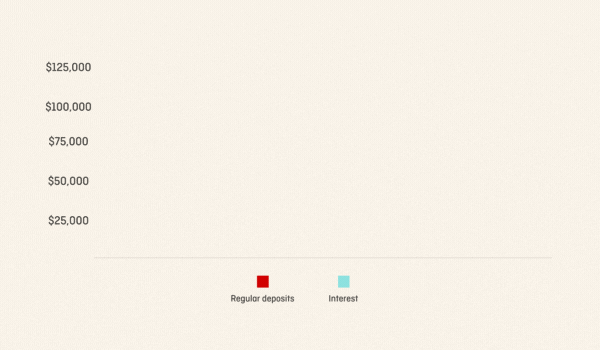How to grow your super and achieve your other financial goals
And do it at the same time
If you’ve ever thought to yourself that you’re spending more than you used to, that’s because you probably are: the Australian Bureau of Statistics found household spending increases depending on both the number of people in a household and their ages.
In the 12 months to June 2016, the ABS found that a lone person aged under 35 spent an average of $849 on goods and services per week, while a couple where at least one person is aged under 35 spent an average of $1,572.
Unsurprisingly, spending continues to grow significantly when kids come into the mix. A family whose youngest child is under five years old spends an average of $1,833 a week.
Meanwhile, a family whose youngest children is between five and 14 years old spends around $2,065 a week.
Overall, Australian households spent an average of $1,425 a week on goods and services in the 12 months to June 2016, or $74,031 over the year.
So it’s easy to see why some Australians push their super to the side until they get closer to retirement. After all, retirement is usually decades away, while the school fees or mortgage need to be paid now.
But achieving your immediate goals and your retirement goals don’t have to be mutually exclusive – it may not take much to achieve both.
Let time and compound interest work for you
According to the Association of Superannuation Funds of Australia (ASFA), a couple will need $690,000 in savings at retirement to enjoy a comfortable lifestyle after work. A single person, meanwhile, will need $595,000. Both these figures assume the retirees own their own home. It sounds daunting, but that’s where the fact retirement is years away works in your favour. Thanks to time and compound interest, growing your super while you work doesn’t have to mean giving up a big slice of your budget.
At its most basic, compound interest means earning interest on interest – for example, if you invest $1,000 and earn $100 in interest, you’ll then begin to earn interest on your new total of $1,100. Simple interest, on the other hand, is always calculated on the principal, or the original $1,000 you invested.
For example, Mark contributes $100 extra to his super per month. That’s just $5 per day, five days a week – for 30 years into a fund earning an annual return of 7 percent, Mark will have contributed $36,000 and earned $85,997 in interest, giving him a total boost of $121,9971.

Now, it’s important to remember that this is a simplified example that doesn’t account for the deduction of any fees or fluctuations in investment returns, but it’s a powerful way to see the change that even a few dollars can make.
1About Mark’s example: This is general advice only, and your individual needs may vary. It is recommended that you consult with a Super Advisor before making any financial decisions. These figures are illustrative only and were calculated using the MoneySmart compound interest calculator www.moneysmart.gov.au (accessed 30 March 2023). The calculation assumes regular deposits are made at the end of month, with interest credited monthly. Results are only estimates, the actual amounts may be higher or lower. We cannot predict things that will affect the modelled outcome, such as product fees, your investment choices and resultant investment returns. The results of this calculator are shown in future dollars. No adjustment has been made for inflation. The investment return assumed is 7% p.a. and is before all fees and taxes. Differences in returns (which may be positive or negative), and fees will alter the outcome. These figures are provided only to demonstrate the principle of compounding and are not intended to represent projected returns in a Qantas Super account.
Use your super now
Though your super is, for the most part, set aside for your time after work, the government has introduced a way for Australians to access part of their super to help pay for a deposit for a home.
With a survey finding 75 of people under 30, and 69 percent of people aged 30 and above believe owning a property is still the great Australian dream, the Federal Government introduced the First Home Super Saver Scheme (FHSS) in 2017 to help more Australians achieve it.
If you are a first home buyer and both the following apply to you, you may be eligible to participate in the FHSS scheme:
- You either live in the premises you’re buying or intend to as soon as practicable; and
- You intend to live in the property for at least six months within the first 12 months you own it, after it’s practicable to move in (if you enter into a contract to build a home, the timeframe may be different)
Under the FHSS scheme, you can apply to have a maximum of $15,000 of your voluntary contributions from any one financial year included in your eligible contributions to be released under the FHSS scheme, up to a total of $50,000 contributions across all years. You’ll also receive the earnings that relate to those contributions.
There are a number of important things to know about the FHSS – learn more.
Learn if salary sacrificing is tax-effective for you
Depending on your circumstances, salary sacrificing could be a tax-effective way for you to either save for your retirement or pay for various expenses – or both.
The Australian Taxation Office (ATO) defines salary sacrifice – also known as salary packaging – as “an arrangement between an employer and an employee, where the employee agrees to forgo part of their future entitlement to salary or wages. This is in return for the employer providing them with benefits of a similar value.”
The types of benefits most often provided in salary sacrifice arrangements by employers can include things like cars, a portable electronic device, and super contributions.
Generally, entering into a salary sacrifice arrangement means you only pay income tax on your reduced salary. Depending on your income tax bracket, this could be tax-effective.
The Qantas Group offers salary sacrificing for a number of things. Eligible employees have the option to salary sacrifice to their super, and to salary sacrifice portable electronic devices, a car, or pay for childcare at a Joey Club.
You can learn more about salary sacrificing and whether it might be right for you via ASIC’s MoneySmart.


